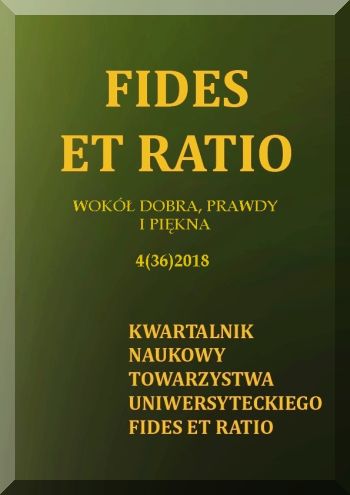Abstract
In the presented study, the focus of interest is psychological well-being (PWB) understood according to the eudaimonistic approach as an accompanying sense of realizing the potential possessed by an individual and living a life in harmony with human nature (Ryff, 1989). In this approach, it is assumed that an individual should possess valuable life goals and strive towards these goals, which is associated with the development of his/her character strengths and virtues. The aim of this study is determination of the importance of work engagement and family engagement in the shaping of individual aspects of well-being approached in this way. The study was conducted in a group of 100 males (mean age M = 33.03, SD = 5.05). All respondents were occupationally active, remained in a close relationship and raised at least one child. The measurement of well-being was performed using the Psychological Well-Being Scales (PWBS) (Ryff and Keyes, 1995), as translated by Krok (2012). Work engagement was assessed by means of the Utrecht Work Engagement Scale (UWES) (Schaufeli, Salanova, Gonzalez-Roma and Bakker, 2002), as translated by Lachowska. The same scale, after adjustment of the content of statements to the family area, was used to measure family engagement. It was found that family engagement of males was positively related with Environmental mastery (β = 0.39**), Positive relations with others (β = 0.41***) and Self-acceptance (β = 0.31**), whereas work engagement - with Self-acceptance (β = 0.17, p < 0.1). In addition, a significant positive relationship was observed between income level and Self-acceptance (β = 0.42***), Personal growth (β = 0.32**), Purpose in life (β = 0.31**) and Positive relations with others (β = 0.27**). Longer working time favoured Positive relations with others (β = 0.16, p < 0.1) and Personal growth (β = 0.17, p < 0.1); however, it destroyed Autonomy (β = -0.34**).
References
Bańka, A., Wołowska, A. (2007). Geneza i rozwój pojęcia przywiązania w koncepcjach funkcjonalności-dysfunkcjonalności przystosowania do środowiska oraz organizacji, (w:) M. Strykowska (red.). Funkcjonalne i dysfunkcjonalne zjawiska organizacyjne. (s. 41-87). Poznań: Wydawnictwo Naukowe UAM.
Bedyńska, S. i Książek, M. (2012). Statystyczny drogowskaz 3. Praktyczny przewodnik wykorzystania modeli regresji oraz równań strukturalnych. Warszawa: Wydawnictwo Akademickie Sedno.
Chirkowska-Smolak, T. (2012). Psychologiczny model zaangażowania w pracę. Poznań: Wydawnictwo Naukowe UAM.
Czapiński, J. (2015). Psychologia pozytywna. Nauka o szczęściu, zdrowiu, sile i cnotach człowieka. Warszawa: Wydawnictwo PWN.
Czapiński, J. (2005a). Wstęp, (w:) Psychologia pozytywna. Nauka o szczęściu, zdrowiu, sile i cnotach człowieka. (s. 7-10). Warszawa: Wydawnictwo Naukowe PWN.
Diener, E., Suh, E., Oishi, S. (1997). Recent findings on subjective well-being. Indian Journal of Clinical Psychology, Vol 24(1), Mar 1997, 25-41.
Diener, E. i Suh, E. (1997). Measuring quality of life: Economic, social, and subjective indicators. Social Indicators Research, 40, 189-216.
Diener, E., Suh, E., M., Lucas, R., E., and Smith, H., L. (1999). Subjective well-being: three decades of progres. Psychological Bulletin, Vol. 125, No. 2, 276-302.
Duckworth, A. L., Steen, T. A. i Seligman, M. E. P. (2005). Positive psychology in clinical practice. Annual Review of Clinical Psychology, 1, 629-651.
Karaś D. i Cieciuch J. (2017). Polska adaptacja kwestionariusza dobrostanu (Psychological well-being Scales) Caroll Ryff. Roczniki Psychologiczne, XX, 4, 815-835.
Krok, D. (2009). Religijność a jakość życia w perspektywie mediatorów psychospołecznych. Opole: Redakcja Wydawnictw Wydziału Teologicznego Uniwersytetu Opolskiego.
Krok, D. (2012). Poczucie sensu życia jako mediator w związkach duchowości i eudajmonistycznego dobrostanu psychicznego. Psychologia jakości życia, 11(2), 145-147
Lachowska, B. (2012). Konflikt i facylitacja między rolami rodzinnymi i zawodowymi a jakość życia pracujących rodziców. Psychologia Społeczna 7(4), 1896-1800. Lublin: Wydawnictwo KUL.
Ryff, C.D. (1985). Adult personality development and the motivation for personal growth, (w:) D. Kleiber, M. Maehr (wyd.), Advances in motivation and achievement, 4. Motivation and adulthood (s. 55-92). Greenwich, CT: JAI Press.
Ryff, C.D. (1989). Happiness is everything, or is it? Explorations on the meaning of psychological well-being. Journal of Personality and Social Psychology, 57, 1069-1081. DOI: 10.1037/00223514.57.6.1069.
Ryff, C.D., Keyes, C.L. (1995). The structure of psychological well-being revisited. Journal of Personality and Social Psychology, 69, 719–727.
Schaufeli, W.B., Salanova, M., Gonzalez-Roma, V., Bakker, A.B. (2002). The measurement of engagement and burnout: A confirmative analytic approach. Journal of Happiness Studies, 3, 71-92.
Seligman, M., E., P. and Csikszentmihalyi M. (2000). Positive psychology: an introduction. American Psychologist, 55(1), 5-14.
Tatarkiewicz, W. (1978). Historia filozofii. Filozofia starożytna i średniowieczna. Tom pierwszy. Warszawa: Państwowe Wydawnictwo Naukowe.
Trempała J. (2000). Koncepcje rozwoju człowieka, (w:) J. Strelau (red.). Psychologia. Podręcznik akademicki. Gdańsk: Gdańskie Wydawnictwo Psychologiczne.
Trzebińska E. (2008). Psychologia pozytywna. Warszawa: Wydawnictwa Akademickie i Profesjonalne spółka z o.o.
